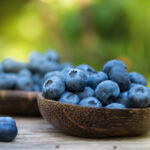Better sea freight needed to raise South Korean fresh blueberry market

A South Korean fruit market analyst has assessed the first Chilean and U.S. fresh blueberry export seasons to his country as "okay", encouraging sea freight in coming seasons to gain share in a predominantly frozen market.
Intnet Co Ltd president Yoonsang Lee said the two countries' first campaigns to South Korea amounted to almost 320 metric tons (MT), compared to a frozen market of 7,000MT.
"As a trial first shipment, most of which was by air, it was okay. All the retailers were happy with the quality, most of the importers were happy – it was just a matter of getting the shipments in for the first time for Chile, I think everyone was rushing into it," he told www.freshfruitportal.com during the Global Berry Congress in Santiago de Chile yesterday.
"With the U.S. they had some problems with suppliers, so for the U.S. we only had about 100MT while Chile was close to about 220MT this season.
"Some did ocean freight and they were successful, so I’m sure come the second year it’ll be much better."
He said a key obstacle for the fresh market was price, with imported fresh blueberries costing 400% more than their frozen counterparts. Lee attributed this to air freight costs and also high tariffs.
He said Chile's tariffs will be reduced to zero next year, but U.S. shipments won't be tariff-free until 2021 with exporters currently having to pay a rate of 36%.
"It all depends on the price. If you can lower the price by sending it ocean freight, it's going to grow," he said.
"Most of the frozen berries are consumed through smoothies, yogurts, or something else, whereas fresh blueberries you want to serve your visitors and friends when they come over."
He said sweetness was very important for South Korean consumers, but for blueberry buyers the value was still more focused on health benefits over taste.
"Koreans, when they think about fruits it has to be sweet, so now with oranges they’re looking at the black label – the super sweet oranges.
"For instance with kiwifruit, when the gold kiwifruit came in all the traders said it’s not going to work because traditionally kiwifruit is supposed to be sour, so having this sweet kiwifruit people are not going to see it as a healthy food, but guess what? Second year, it was booming, there was a lack of supply.
"Blueberries are a bit different because it's such a super healthy fruit that it doesn’t really matter if it’s not as sweet as the traditional other fruits, but actually when you taste the fresh blueberry it is sweet. When you eat the frozen ones, it’s not sweet at all, so there is a difference."
He added there were strong opportunities for other Chilean fruits as well.
"I was surprised that the Chileans got blueberries in first because what they should have got was cherries. Cherries are the hot product right now.
"Last year we did over 9,000MT, whereas in 2010 it was around 3,500MT, and that was mainly because of the tariff going down for the U.S."

















































